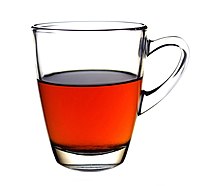
Photo from wikipedia
Ovarian cancer (OC) accounts for 4% of female malignancies worldwide, and its prognosis is unfavorable. Currently available epidemiologic data suggest that non-herbal tea consumption may reduce OC risk, but these… Click to show full abstract
Ovarian cancer (OC) accounts for 4% of female malignancies worldwide, and its prognosis is unfavorable. Currently available epidemiologic data suggest that non-herbal tea consumption may reduce OC risk, but these evidences are inconsistent. A comprehensive literature search for observational epidemiologic studies reporting associations between non-herbal tea consumption and OC risk was conducted in electronic databases. A random-effects model was used to synthesize effect measures in binary meta-analysis, and adjusted indirect comparison was used to compare whether there was a difference in effects between green tea (GT) and black tea (BT). Both linear and non-linear models were used to explore the dose-response relationship. Fourteen studies were included, and we obtained an inverse and significant pooled estimate in binary meta-analysis [risk ratio (RR)pool = 0.76, 95% confidence interval (CI) 0.61-0.95, PCochran < 0.001, I2 = 81.5%]. No publication bias was identified in binary meta-analysis. In binary meta-analysis stratified by tea types, we observed a significant association for GT (RRpool = 0.64, 95% CI 0.45-0.90, PCochran = 0.071, I2 = 53.6%), but not BT (RRpool = 0.85, 95% CI 0.65-1.12, PCochran = 0.007, I2 = 65.9%). Indirect comparison, which treated BT as the reference, showed an inverse but non-significant association (RRGT versus BT = 0.74, 95% CI 0.48-1.15). Both linear and non-linear models found that OC risk decreased as the consumption levels of total non-herbal tea increased. However, the dose-response relationship was stronger for GT when compared with BT. Our results suggest that non-herbal tea, especially GT, is associated with a reduced risk of OC. Future studies should explore biochemical evidence regarding the variation in chemopreventive effects between different types of non-herbal tea.
Journal Title: Carcinogenesis
Year Published: 2018
Link to full text (if available)
Share on Social Media: Sign Up to like & get
recommendations!